Hans Söhnker (1903-1981) was a German film actor. He appeared in 105 films between 1933 and 1980. The understatement and elegance of his acting was reminiscent of American film stars and made him an extraordinary presence in the German cinema.
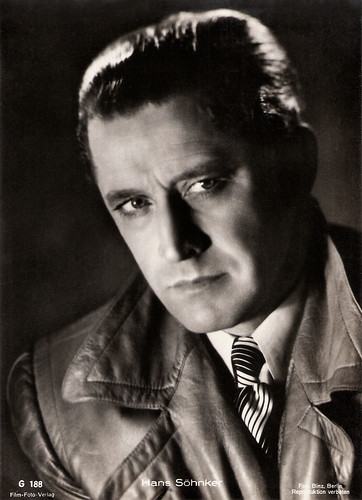
German postcard by Film-Foto-Verlag, no. G 188, 1941-1944. Photo: Binz, Berlin.
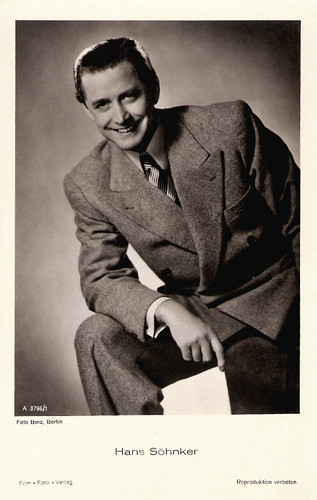
German postcard by Film-Foto-Verlag, no. A 3796/1, 1941-1944. Photo: Binz, Berlin.
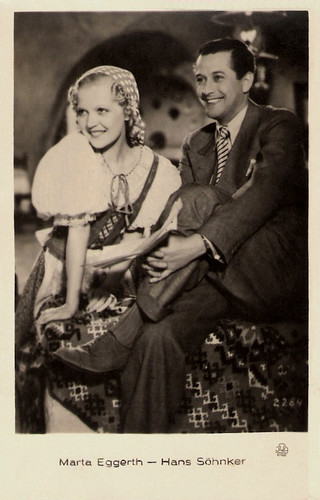
Latvian postcard., no. 2284. Photo: J. Rolin (?), Riga. With Martha Eggerth in Der Zarewitsch/The Czarevitch (Victor Janson, 1933).
Hans Albert Edmund Söhnker was born in Kiel in 1903. His father was a carpenter and a book-seller, and an active member of the Social Democratic Party.
After finishing school, Hans took up an apprenticeship in a warehouse and at the same time he started taking acting lessons from Clemens Schubert and Gustaf Gründgens. In 1922, he made his stage debut at the Stadttheater Kiel, and subsequently played in theatres in Frankfurt/Oder, Danzig, Chemnitz and Bremen.
He made screen tests for the Ufa, and was finally cast by Victor Janson as Martha Eggerth's partner in Der Zarewitsch/The Czarevitch (Victor Janson, 1933). He reprised the role of the young and careless lover for Schwarzwaldmädel/The Black Forest Girl (Georg Zoch, 1933) and Die Csardasfürstin/The Czardas Princess (Georg Jacoby, 1934).
He avoided being typecast again and instead proved his ability to play more serious characters with Arzt aus Leidenschaft/Medicine Man (Hans H. Zerlett, 1936).
His other films include Jede Frau hat ein Geheimnis/Every Woman Has A Secret (Max Obal, 1934), Eva (Johannes Riemann, 1935), Diener lassen bitten/Dinner Is Served (Hans H. Zerlett, 1936), and Truxa (Hans H. Zerlett, 1936) starring La Jana.
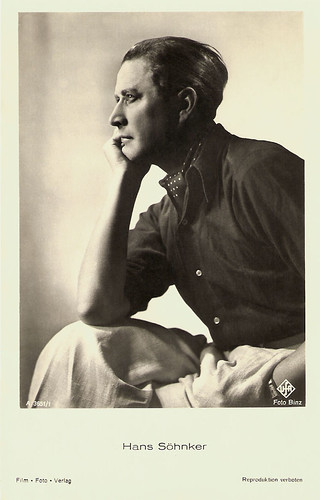
German postcard by Film-Foto-Verlag, no. A 3651/1, 1941-1944. Photo: Tita Binz / Ufa.
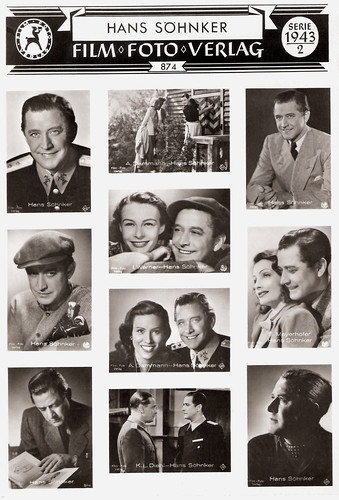
German presentation card by Film-Foto-Verlag, no. 874, series 1943/2.
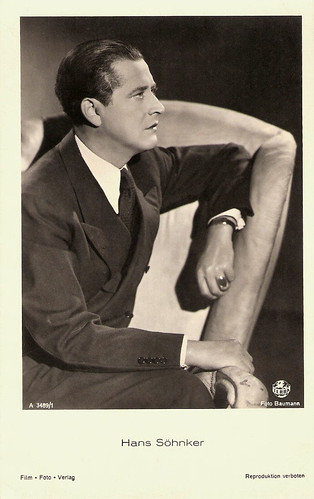
German postcard by Film-Foto-Verlag, no. A 3489/1, 1941-1944. Photo: Baumann / Terra.
Hans Söhnker excelled as the romantic rival of both Heinz Rühmann in Der Mustergatte/Model Husband (Wolfgang Liebeneiner, 1937) and Hans Albers in Große Freiheit Nr. 7/Great Freedom No. 7 (1944).
The latter was directed by Helmut Käutner, who frequently cast Söhnker. Käutner put Söhnker's natural charm to its best use, for instance in Frau nach Maß/Customized Woman (Helmut Käutner, 1940) based on a play by Erich Kästner.
These films made him an Ufa-star in Nazi Germany. During the Third Reich he was also on the Gestapo's black list because he often helped and hid Jews.
After the war, Söhnker, who had always continued to work as a stage actor, returned to the theatre. He re-emerged as a film actor with Film ohne Titel/Film Without Title (1947), which was produced by Käutner and directed by Rudolf Jugert.
Jugert also cast Söhnker in the comedies Hallo Fräulein/Hello Fraulein (Rudolf Jugert, 1949) and Einmaleins der Ehe/Marriage – The Basics (Rudolf Jugert, 1949).
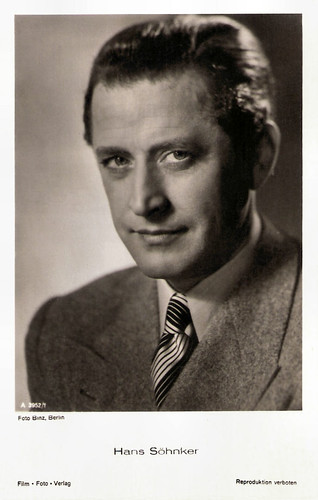
German postcard by Film-Foto-Verlag, no. A 3952/1, 1941-1944. Photo: Foto Binz, Berlin. From Tatiana.
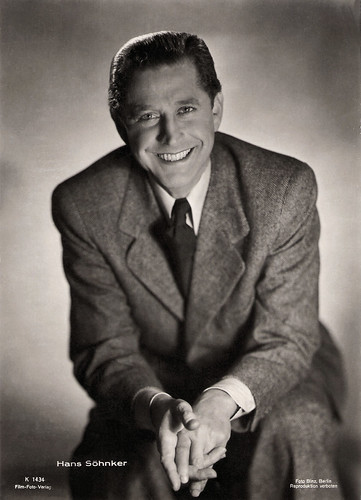
German postcard by Film-Foto-Verlag, no. K 1434. Photo: Tita Binz, Berlin.
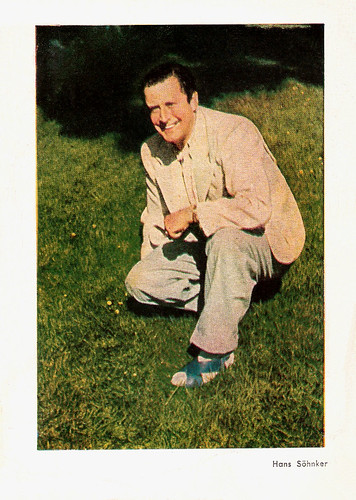
German postcard by Verlag und Druckerei Erwin Preuss, Dresden-Freital, series 1, no. 20. Photo: Charlott Serda.
His dramatic performances in Nur eine Nacht/Just One Night (Fritz Kirchhoff, 1950) with Marianne Hoppe, and Weiße Schatten/White Shadows (Helmut Käutner, 1951) again proved his ability to shift effortlessly between genres.
The well aged Söhnker remained an elegant presence in the German Post-War cinema of the 1950s. Films include Die Stärkere/The Stronger Ones (Wolfgang Liebeneiner, 1953), Hoheit lassen bitten/Majesty Allow To Plea (Paul Verhoeven, 1954), and Worüber man spricht/False Shame (Wolfgang Glück, 1958).
From the 1960s on, he starred in several successful TV series like Der Forellenhof/The Trout Farm (1965), Salto Mortale (1968), and Meine Schwiegersöhne und ich/My Sons-in-law and I (1969), which sustained Söhnker's popularity up to his old age.
He also made films like Unser Haus in Kamerun/Our House in Cameroun (Alfred Vohrer, 1961), Sherlock Holmes und das Halsband des Todes/Sherlock Holmes and the Deadly Necklace (Terence Fisher, Frank Winterstein, 1962) starring Christopher Lee, Sechs Stunden Angst/Six Hours of Terror (Eugen York, 1964), and the Edgar Wallace thriller Der Hund von Blackwood Castle/The Monster of Blackwood Castle (Alfred Vohrer, 1967).
In 1973 he was awarded Germany's Bundesverdienstktreuz, and in 1977 the Filmband in Gold for his lifetime achievements. He published his memoires ...und kein Tag zuviel/And Not A Day Too Many in 1974.
Hans Söhnker passed away in Berlin in 1981. He was twice married. Actress Anneke Kim Sarnau is his great-granddaughter.
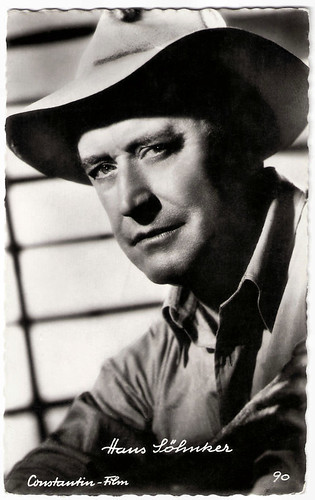
Austrian postcard by Verlag Hubmann (HDH Verlag), Wien, no. 90. Photo: Constantin-Film. Publicity still for Die Stärkere/The stronger (Wolfgang Liebeneiner, 1953).
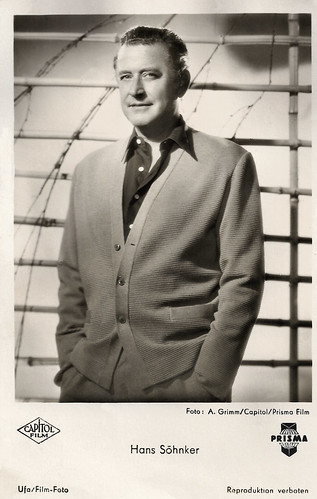
German postcard by Ufa, no. FK 573. Photo: Grimm / Capitol / Prisma Film. Publicity still for Ein Leben für Do/A Life for Do (Gustav Ucicky, 1954).
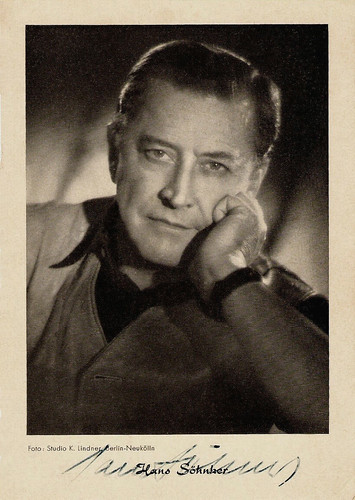
German card, mailed in 1955. Photo: Studio K. Lindner, Berlin-Neukölln.
Scene from Und du mein Schatz fährst mit! (1936). Source: Hargo 1962 (YouTube).
Sources: Filmportal.de, Thomas Staedeli (Cyranos), Wikipedia (German), and IMDb.

German postcard by Film-Foto-Verlag, no. G 188, 1941-1944. Photo: Binz, Berlin.

German postcard by Film-Foto-Verlag, no. A 3796/1, 1941-1944. Photo: Binz, Berlin.

Latvian postcard., no. 2284. Photo: J. Rolin (?), Riga. With Martha Eggerth in Der Zarewitsch/The Czarevitch (Victor Janson, 1933).
Young, Careless Lover
Hans Albert Edmund Söhnker was born in Kiel in 1903. His father was a carpenter and a book-seller, and an active member of the Social Democratic Party.
After finishing school, Hans took up an apprenticeship in a warehouse and at the same time he started taking acting lessons from Clemens Schubert and Gustaf Gründgens. In 1922, he made his stage debut at the Stadttheater Kiel, and subsequently played in theatres in Frankfurt/Oder, Danzig, Chemnitz and Bremen.
He made screen tests for the Ufa, and was finally cast by Victor Janson as Martha Eggerth's partner in Der Zarewitsch/The Czarevitch (Victor Janson, 1933). He reprised the role of the young and careless lover for Schwarzwaldmädel/The Black Forest Girl (Georg Zoch, 1933) and Die Csardasfürstin/The Czardas Princess (Georg Jacoby, 1934).
He avoided being typecast again and instead proved his ability to play more serious characters with Arzt aus Leidenschaft/Medicine Man (Hans H. Zerlett, 1936).
His other films include Jede Frau hat ein Geheimnis/Every Woman Has A Secret (Max Obal, 1934), Eva (Johannes Riemann, 1935), Diener lassen bitten/Dinner Is Served (Hans H. Zerlett, 1936), and Truxa (Hans H. Zerlett, 1936) starring La Jana.

German postcard by Film-Foto-Verlag, no. A 3651/1, 1941-1944. Photo: Tita Binz / Ufa.

German presentation card by Film-Foto-Verlag, no. 874, series 1943/2.

German postcard by Film-Foto-Verlag, no. A 3489/1, 1941-1944. Photo: Baumann / Terra.
Natural Charm
Hans Söhnker excelled as the romantic rival of both Heinz Rühmann in Der Mustergatte/Model Husband (Wolfgang Liebeneiner, 1937) and Hans Albers in Große Freiheit Nr. 7/Great Freedom No. 7 (1944).
The latter was directed by Helmut Käutner, who frequently cast Söhnker. Käutner put Söhnker's natural charm to its best use, for instance in Frau nach Maß/Customized Woman (Helmut Käutner, 1940) based on a play by Erich Kästner.
These films made him an Ufa-star in Nazi Germany. During the Third Reich he was also on the Gestapo's black list because he often helped and hid Jews.
After the war, Söhnker, who had always continued to work as a stage actor, returned to the theatre. He re-emerged as a film actor with Film ohne Titel/Film Without Title (1947), which was produced by Käutner and directed by Rudolf Jugert.
Jugert also cast Söhnker in the comedies Hallo Fräulein/Hello Fraulein (Rudolf Jugert, 1949) and Einmaleins der Ehe/Marriage – The Basics (Rudolf Jugert, 1949).

German postcard by Film-Foto-Verlag, no. A 3952/1, 1941-1944. Photo: Foto Binz, Berlin. From Tatiana.

German postcard by Film-Foto-Verlag, no. K 1434. Photo: Tita Binz, Berlin.

German postcard by Verlag und Druckerei Erwin Preuss, Dresden-Freital, series 1, no. 20. Photo: Charlott Serda.
Elegant Presence
His dramatic performances in Nur eine Nacht/Just One Night (Fritz Kirchhoff, 1950) with Marianne Hoppe, and Weiße Schatten/White Shadows (Helmut Käutner, 1951) again proved his ability to shift effortlessly between genres.
The well aged Söhnker remained an elegant presence in the German Post-War cinema of the 1950s. Films include Die Stärkere/The Stronger Ones (Wolfgang Liebeneiner, 1953), Hoheit lassen bitten/Majesty Allow To Plea (Paul Verhoeven, 1954), and Worüber man spricht/False Shame (Wolfgang Glück, 1958).
From the 1960s on, he starred in several successful TV series like Der Forellenhof/The Trout Farm (1965), Salto Mortale (1968), and Meine Schwiegersöhne und ich/My Sons-in-law and I (1969), which sustained Söhnker's popularity up to his old age.
He also made films like Unser Haus in Kamerun/Our House in Cameroun (Alfred Vohrer, 1961), Sherlock Holmes und das Halsband des Todes/Sherlock Holmes and the Deadly Necklace (Terence Fisher, Frank Winterstein, 1962) starring Christopher Lee, Sechs Stunden Angst/Six Hours of Terror (Eugen York, 1964), and the Edgar Wallace thriller Der Hund von Blackwood Castle/The Monster of Blackwood Castle (Alfred Vohrer, 1967).
In 1973 he was awarded Germany's Bundesverdienstktreuz, and in 1977 the Filmband in Gold for his lifetime achievements. He published his memoires ...und kein Tag zuviel/And Not A Day Too Many in 1974.
Hans Söhnker passed away in Berlin in 1981. He was twice married. Actress Anneke Kim Sarnau is his great-granddaughter.

Austrian postcard by Verlag Hubmann (HDH Verlag), Wien, no. 90. Photo: Constantin-Film. Publicity still for Die Stärkere/The stronger (Wolfgang Liebeneiner, 1953).

German postcard by Ufa, no. FK 573. Photo: Grimm / Capitol / Prisma Film. Publicity still for Ein Leben für Do/A Life for Do (Gustav Ucicky, 1954).

German card, mailed in 1955. Photo: Studio K. Lindner, Berlin-Neukölln.
Scene from Und du mein Schatz fährst mit! (1936). Source: Hargo 1962 (YouTube).
Sources: Filmportal.de, Thomas Staedeli (Cyranos), Wikipedia (German), and IMDb.
No comments:
Post a Comment